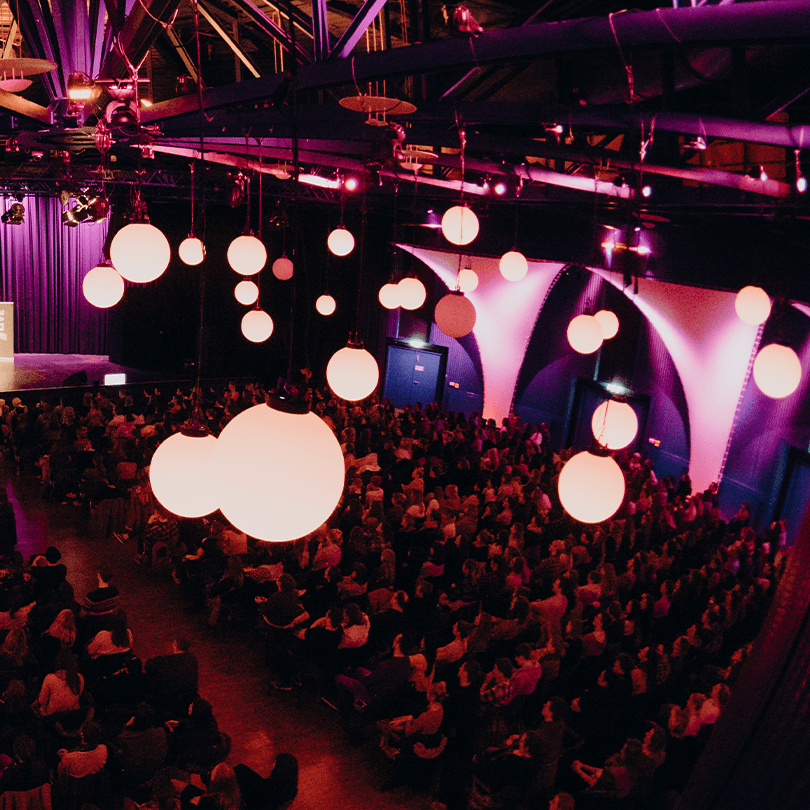Conclusion of the First World Copernican Congress in Toruń (21.02.2023)
The 1st World Copernican Congress in Toruń was officially closed by the Deputy Minister of Education and Science, Tomasz Rzymkowski. He also invited to the Second Copernican Congress in five years’ time.
“The Copernican idea is similar to the Olympics, the only difference is that our Copernican Games – the World Copernican Congresses are held every five years. The first one is practically over, the next one is in five years’ time. On behalf of the Academy, I would like to invite everyone to the Second World Copernican Congress. And I consider the First World Copernican Congress concluded”, said the Deputy Head of the Ministry of Education and Science.
Earlier, the organisers and guests of the Congress were thanked by the Secretary General of the Copernican Academy, Professor Krzysztof M. Górski.
“We have succeeded, three days are coming to an end. I hope that the astronomers, friends, fellow scientists who visited us here will leave with the conviction that we have discussed many different topics, and, in terms of our disciplines, we are doing well”, said Prof. Górski.
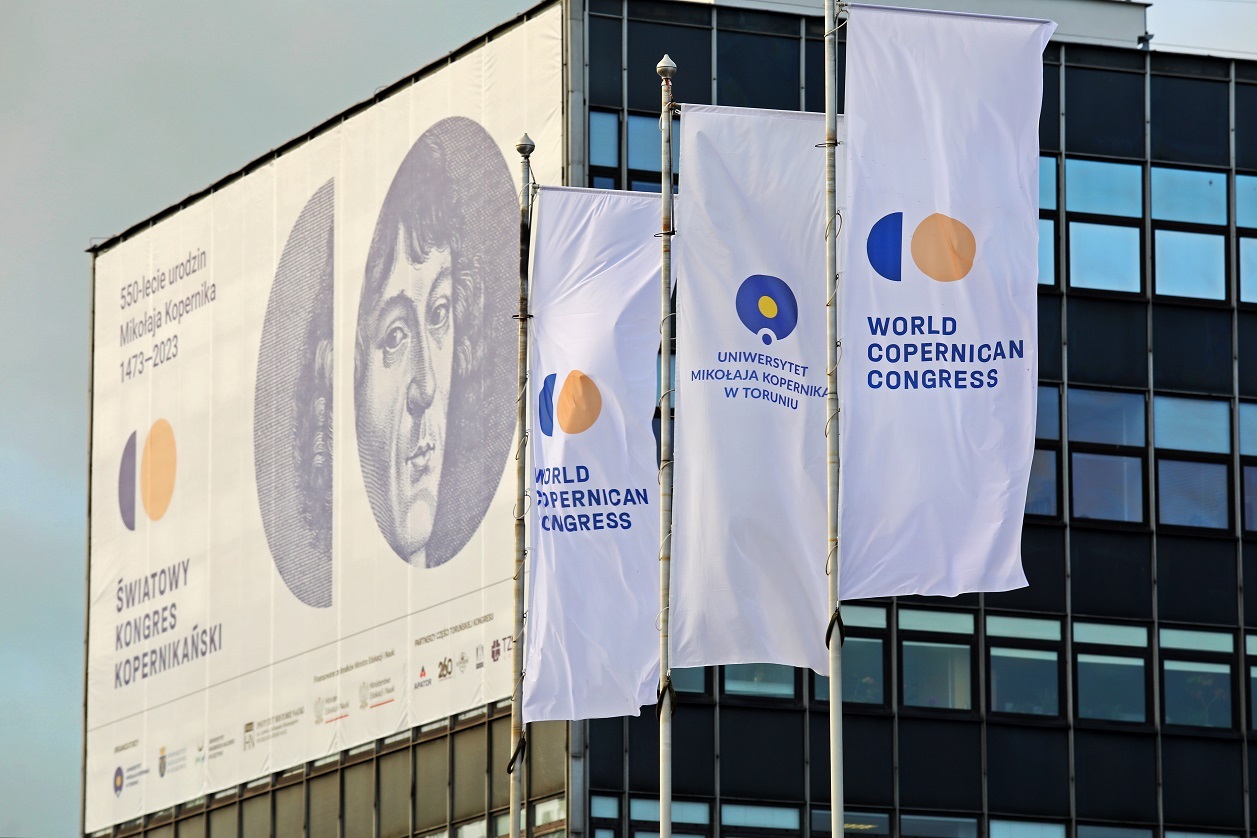
Third day of the Copernican Congress holds debates on the future of Russia and the sources of Poland’s economic success
On the final day of the Copernican World Congress, scientists continued the astronomical debates. They also considered whether the constitutionalism of Western civilisation still exists and discussed the future of Russia and the sources of Poland’s economic success.
“In the last thirty years, we have recorded exceptional economic development. The gap with the countries of Europe was being made up. Comparing GDP per capita in 1990, Poland produced 30 % of Germany’s product; today it is around 60 %”, said the moderator of the economic debate, Prof. Jakub Growiec.
The debate on the sources of Poland’s success and challenges for the future was attended by Prof. Leon Podkaminer, a retired employee of the Vienna Institute for International Economic Comparisons, Prof. Cezary Kochalski from the Monetary Policy Council, and the Poznań University of Economics, as well as Prof. Jacek Kotłowski and Dr. Magda Ciżkowicz-Pękała from the Department of Economic Analysis and Research of the National Bank of Poland NBP.
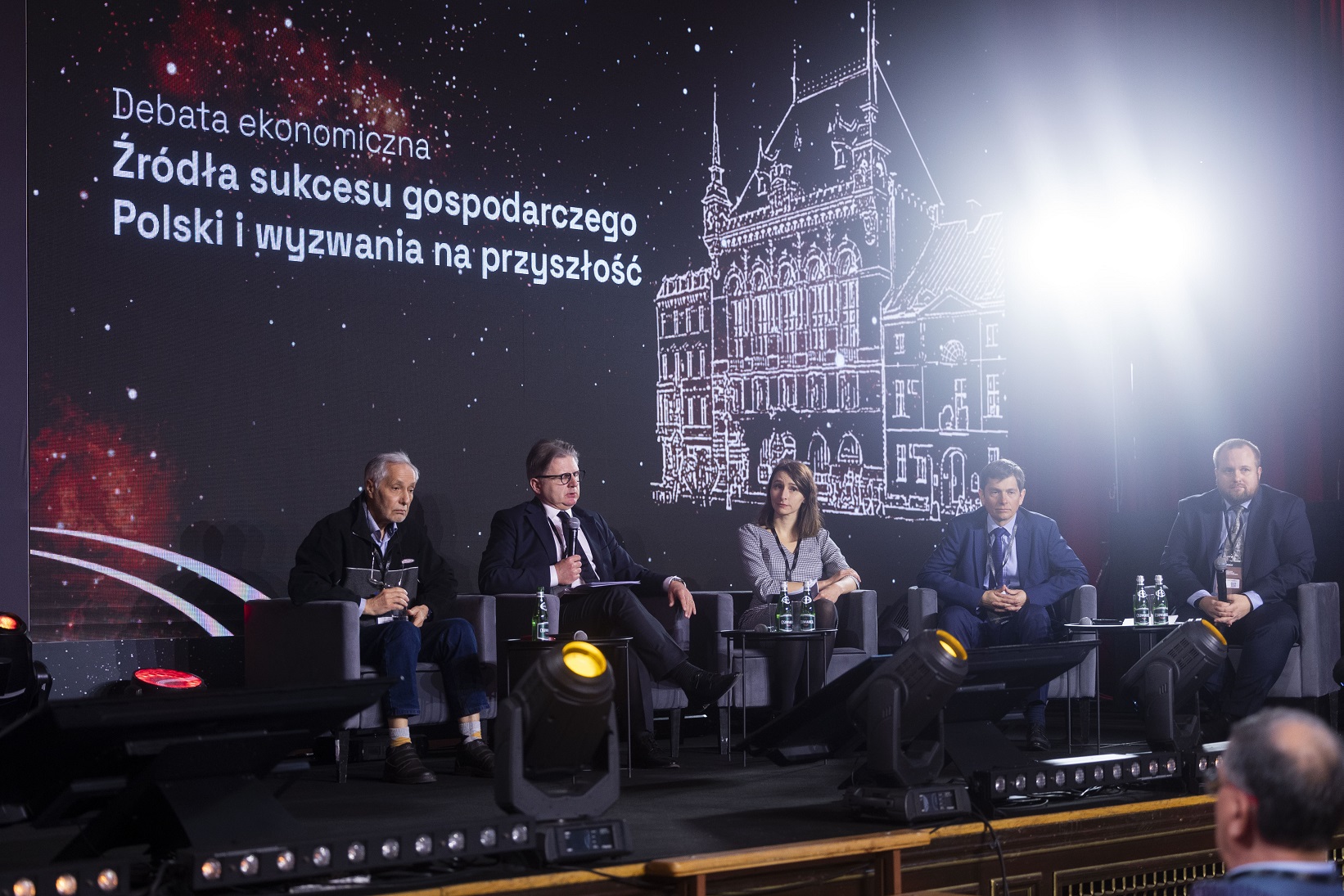
Toruń Declaration signed at the Copernicus World Congress (21.02.2023)
During the World Copernican Congress in Toruń, ministers responsible for scientific research from Poland, the Czech Republic, Georgia, Iraq, Malta, Rwanda, Slovakia, Ukraine, and the United Kingdom signed the Toruń Declaration.
“As the ministers responsible for the conditions of scientific research in our states, on the 550th anniversary of the birth of Nicolaus Copernicus, we declare to take all measures to ensure the freedom to conduct scientific research as well as the freedom of scientific criticism and debate”, says the declaration.
The signatories stressed that scientific research can only be carried out in under conditions of full freedom to conduct such activities, unrestricted publication of the results of such research, but also unrestricted in any way, the possibility of subjecting the published research results to honest and critical scientific debate.
“It is only in such an atmosphere that the true development of science, and consequently the development of nations and states, is possible”, wrote the ministers.
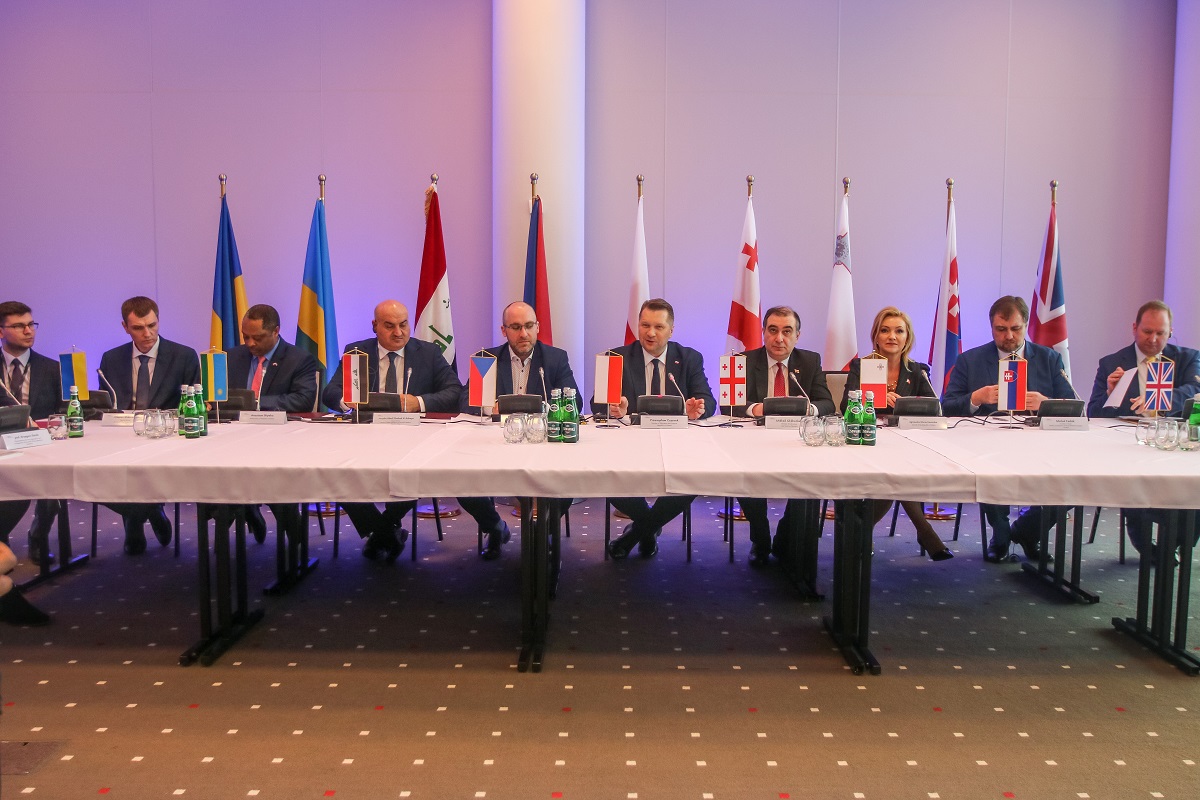
Copernican World Congress hosts a debate of seven European central bank governors (20.02.2023)
The debate of the governors of European central banks was the last item on the agenda on the second day of the Copernican World Congress in Toruń. Opening the debate, the President of the National Bank of Poland (NBP), Adam Glapiński, spoke about the importance of the Congress and the Copernican Academy.
“I am extremely pleased to be with you in such circumstances and at such a moment. I feel really moved”, said the NBP President. According to him, the World Copernican Congress is an exceptional event that will become a part of history, and the Copernican Academy established during the Congress is the first university established in free Poland.
“It is a mighty great institution. The people who contributed to the establishment of this institution will become part of history forever. In particular, Minister Czarnek and President Duda. These moments are also important for economics and management sciences”, said Adam Glapiński
The NBP President also spoke about the cooperation between the Academy and the central bank, which is intended to contribute to the creation of a truly modern, global elite in the good sense of the word. “An elite in terms of the level of teaching, the level of knowledge and publications”, added Adam Glapiński.
The situation of central banks in times of pandemics and rising energy prices was discussed in Toruń’s Artus Manor by Adam Glapiński, President of NBP, Martin Schlegel, Deputy Governor of the Swiss National Bank, Sandra Švaljek, Deputy Governor of the National Bank of Croatia, Sergiy Nikolaychuk, Deputy Governor of the National Bank of Ukraine, Simonas Krėpšta from the Management Board of the Bank of Lithuania, Iliya Lingorski from the Management Board of the Bulgarian National Bank and Cristian Popa from the Management Board of the National Bank of Romania.
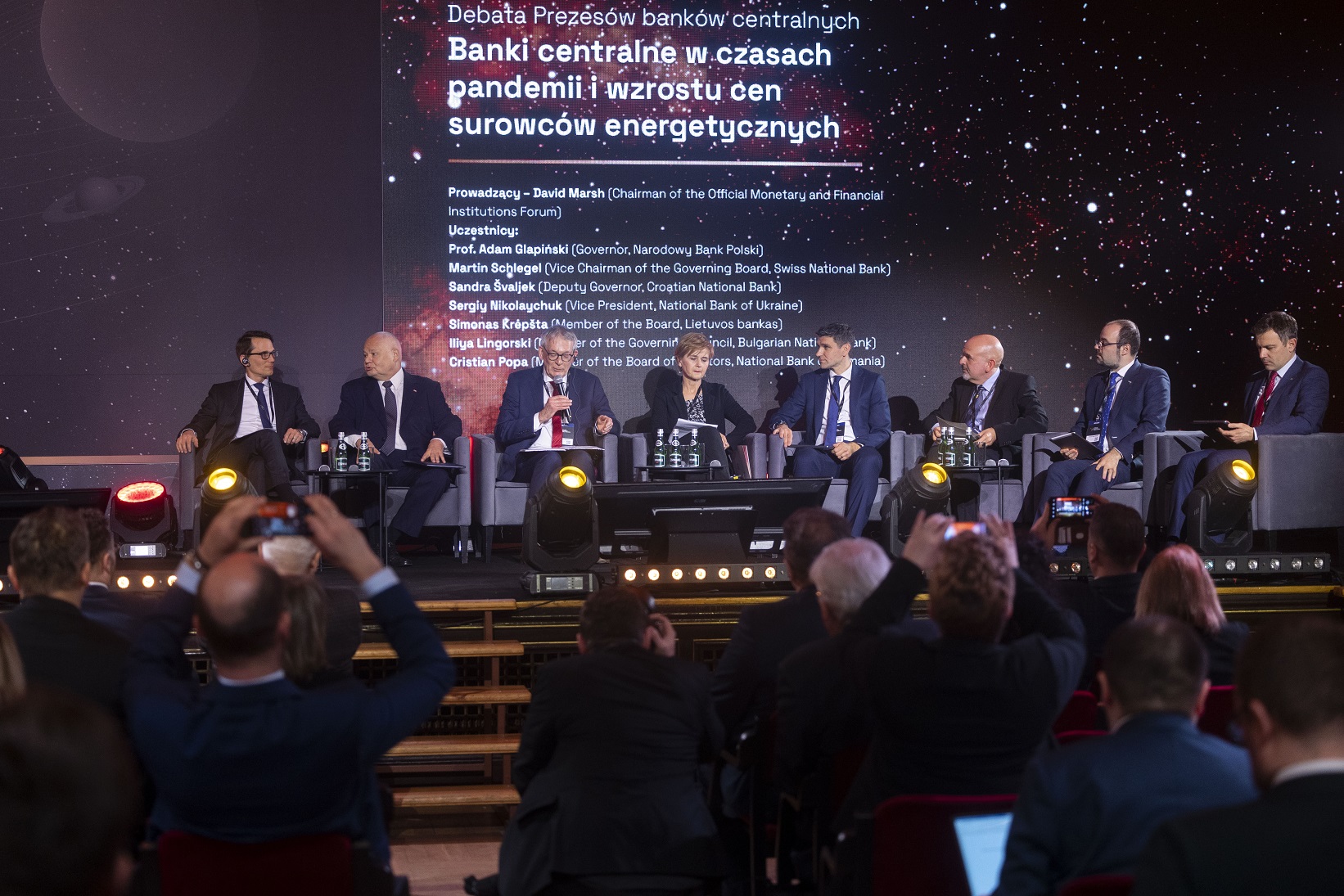
Prime Minister Mateusz Morawiecki speaks at the Copernican World Congress in Toruń (20.02.2023)
Prime Minister Mateusz Morawiecki, in his address at the Copernican World Congress, spoke about modern technologies, including the internet, artificial intelligence and cloning, and the paradoxes related to them.
“The invention of the internet was supposed to connect us into a single global village, but it has also become the leaven of many problems and the beginning of new isolation and enslavement on a scale we have not known before, if it ends up in the hands of dictators, autocrats, which is what happens”, assessed the Prime Minister.
Mateusz Morawiecki talked in the lobbies of the Congress with Nobel laureates invited to Toruń about the origins of the world and cosmic phenomena, as well as the era of artificial intelligence that is soon to come.
“The motto of the Enlightenment was ‘sapere aude’ – ‘have the courage to be wise’. So, we must ask ourselves whether the price for the benefits of artificial intelligence is to abandon wisdom. Just as we need to ask whether, for the benefits of cloning capability, the price is not, or will not be, giving up humanity or a part of it”, said the head of government.
The Prime Minister also spoke of science, which in the free world serves to make people’s lives safer, better, and more dignified, and of the hope that advances in knowledge will help us to progress and make us humble before the world.
“Because the combination of the two great qualities that push human beings forward, humility and the desire to seek truth and new horizons, are the greatest of virtues that help us build a better world”, concluded Mateusz Morawiecki.
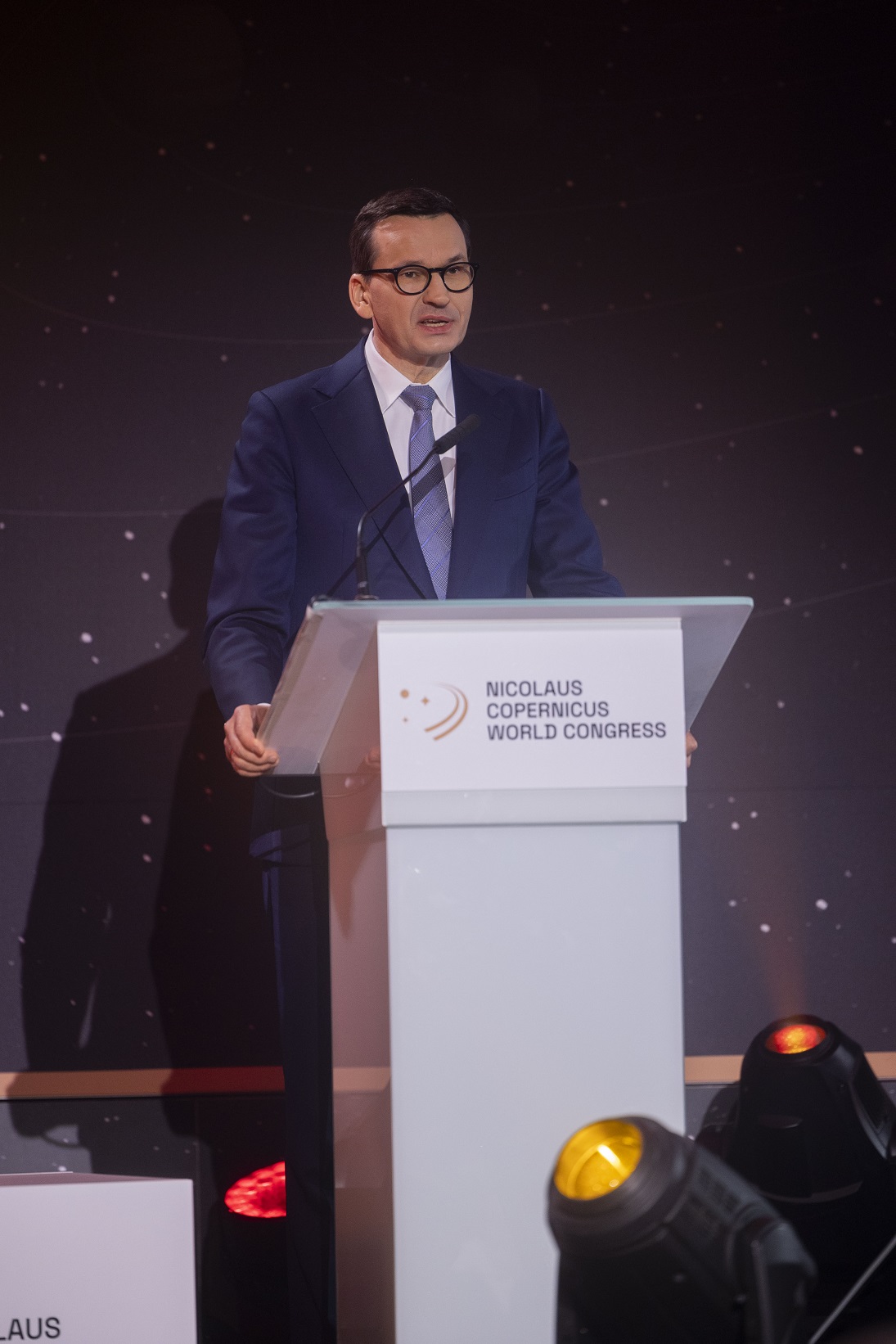
Nobel Laureate in Physics speaks about exoplanets and life in the universe (20.02.2023)
Lectures by Nobel laureates inaugurated the second day of the World Copernican Congress. Swiss astronomer Professor Didier Queloz focused his presentation ‘Exoplanets and Life in the Universe’ on an issue correlated with the World Copernican Congress.
“I will talk about something that broadens the perspective of Copernican theory. Copernicus changed, in a way, the concept of the perception of the world, the perception of the planets, because our planet is, when viewed from the outside, the same as any other planet. We have managed to discover many planets, but the revolution is happening all the time. This also applies to life itself”, he said.
Didier Queloz is a researcher at the University of Cambridge, the University of Geneva and ETH Zurich. In 2019, together with Michel Mayor, he was awarded the Nobel Prize in Physics for the discovery of an exoplanet orbiting a solar-type star. Queloz and Mayor received half of the prize for this discovery, with the other half awarded to James Peebles, who is also a guest of Congress.
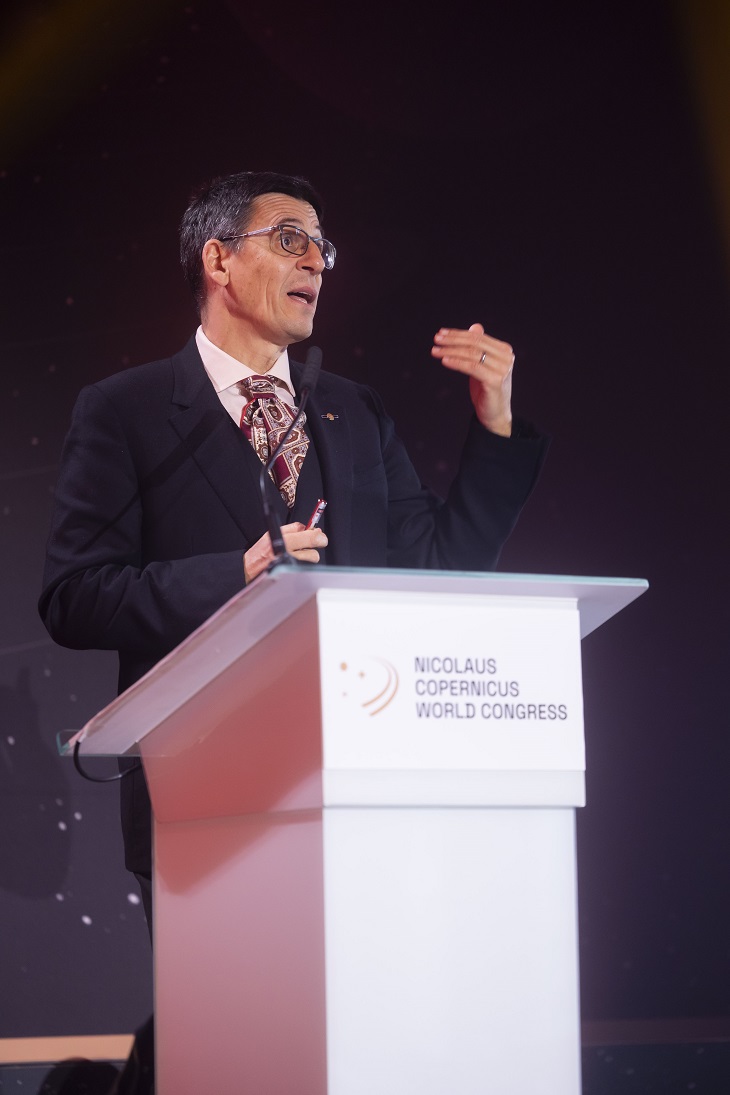
Canadian Nobel laureate as guest speaker at Copernican World Congress (20.02.2023)
The Congress address by Prof. Arthur B. McDonald of Canada’s Queen’s University was focused on particle astrophysics and nuclear physics. According to the Nobel laureate, a great deal has happened in these research areas, and astrophysics is one of the disciplines that can most benefit society.
“Astrophysics is a field that is developing very rapidly. Underground laboratories are excellent locations to detect particles with high sensitivity. Poland is an active participant in this research. All this will allow us to push the technological boundaries and benefit society”, said Prof McDonald.
The 2015 Nobel Laureate in Physics also spoke about his impressions of his stay in Toruń.
“I would like to thank the organisers for inviting me to this beautiful city. My wife said that there was a lot to see here and that she had socks with Copernicus on them for me to remind me of the wonderful events that took place here”, said the Nobel laureate.
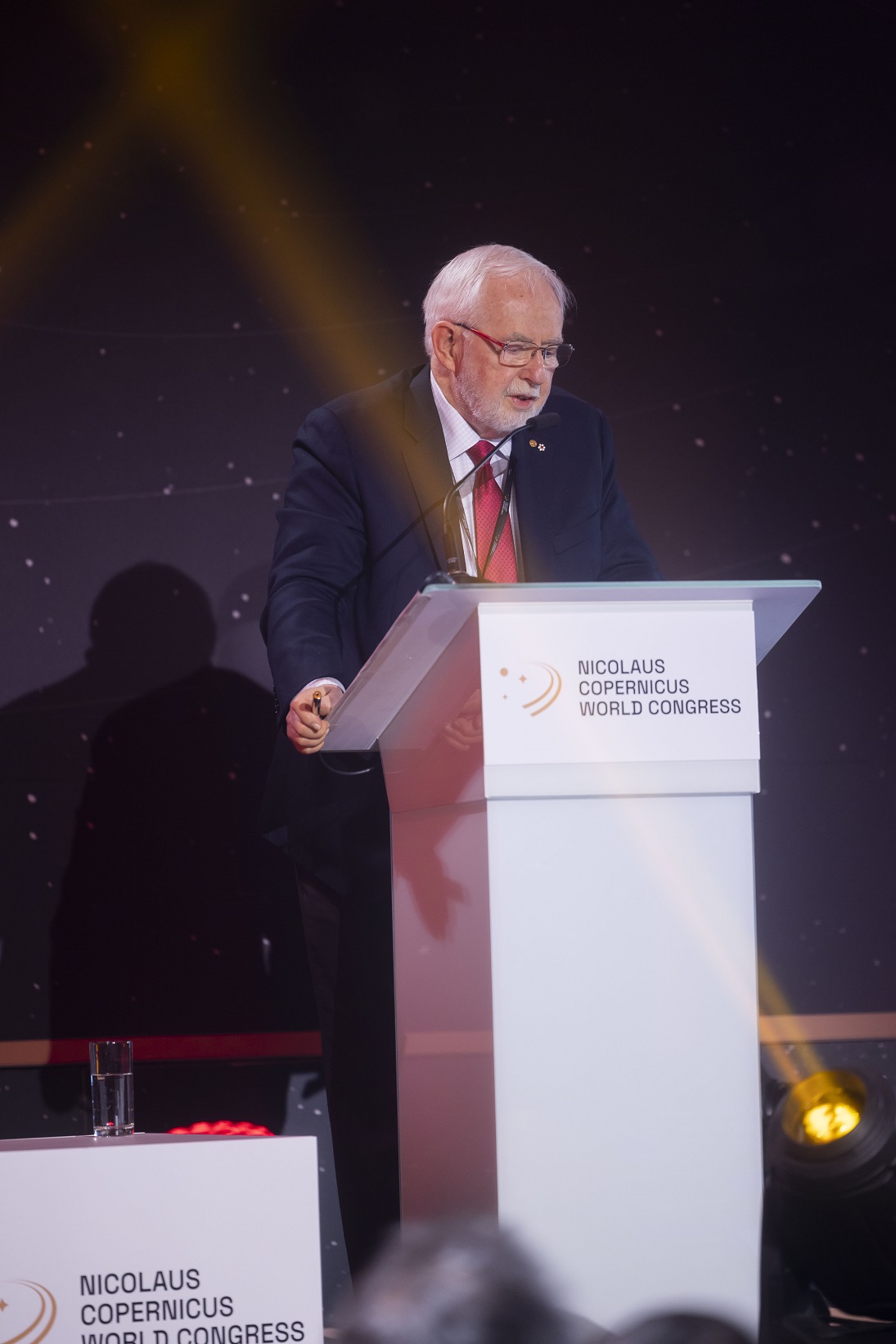
Lectures by Nobel laureates mark the start of the second day of the World Copernican Congress (20.02.2023)
The second day of the World Copernican Congress began with presentations by Nobel Prize winners. The first to speak was Prof. Barry C. Barish, winner of the 2017 Nobel Prize in Physics.
In his presentation “From Einstein to the new science”, Prof. Barish, from the California Institute of Technology, introduced the audience to the topic of gravitational waves and the research perspectives of this issue. According to him, by using very precise tools over the next ten years, scientists will be able to work with gravitational waves in a much more precise way.
The Nobel laureate thanked the Congress organisers for the invitation. He said that this was not his first stay in Poland, but his first visit in the city of Nicolaus Copernicus.
“I am happy to be here with you and to celebrate the anniversary of a scientist I knew from a young age, before I became a scientist myself. This is a fantastic occasion for me”, said Prof Barish.
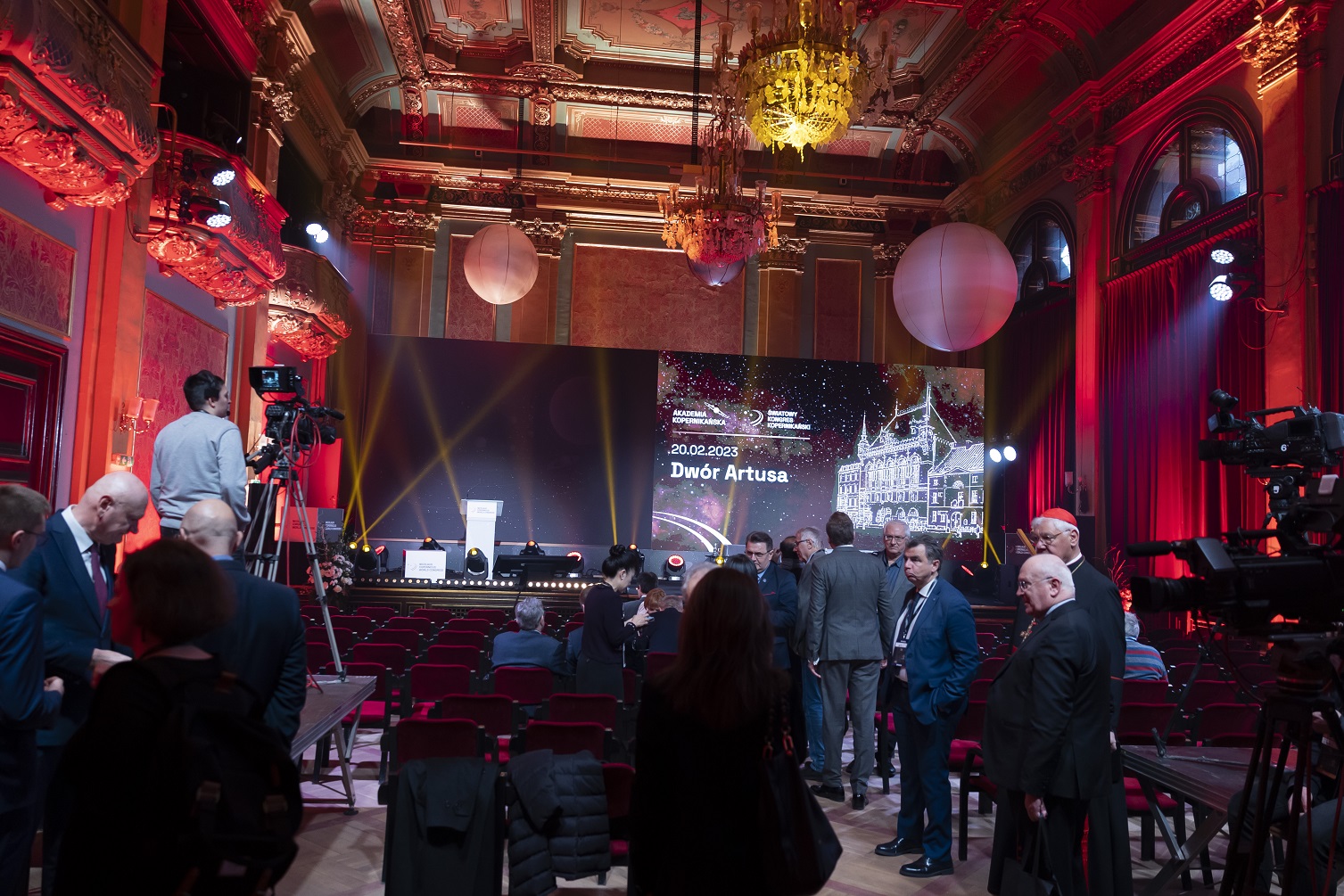
Polish Science Gala held during the World Copernican Congress (19.02.2023)
In Toruń, during the Polish Science Gala organised as part of the World Copernican Congress, the Minister of Education and Science, Przemysław Czarnek, presented awards to outstanding Polish scientists. Researchers were awarded in five categories.
“The prizes are awarded for outstanding scientific achievements, possible not only thanks to the talents of our prize-winners, but also due to the university and institute teams that create the conditions and the platform to undertake this research and reveal this truth to us”, said the minister at the ceremony.
The first award category was ‘Significant achievements in scientific activity’. The awards were received by: Dr. Grzegorz Zuzel, Dr. Marcin Misiasz, Prof. Matthias Bochtler, Dr. Humberto Couto Fernandes, Igor Helbrecht, Katarzyna Krakowska, Prof. Eng. Agnieszka Cydzik-Kwiatkowska, Dr. Eng. Magdalena Zielińska, Prof. Eng. Marcin Kamiński, Dr. Łukasz Rąbalski, Dr. Eng. Robert Smoleński, Dr. Jakub Lipski, Dr. Eng. Dariusz Garbiec, Dr. Eng. Artur Piotr Durajski, Dr. Jacek Potocki, MD. In the category “Significant achievements in the field of teaching activities”, Dr.Wioletta Boznańska, M.D., was awarded.
In the category of ‘Significant achievements in implementation activities’, the following laureates were distinguished: Prof. Natalia Maria Marek-Trzonkowska, MD; Dr. Karolina Elżbieta Piekarska, MD; Dr. Monika Piwowar, MD; Dr. Wojciech Placha, MD; Dr. Anna Sikora, Dr. Eng. Anna Detman, Dr. Karol Olejniczak, Grzegorz Rzeźnik, Paweł Chaber, Iwona Gasińska-Mulczyńska, MD; Bartosz Lendzion, Prof. Eng. Krzysztof Jóźwiakowski, Prof. Eng. Magdalena Gajewska, Prof. Eng. Kazimierz Darowicki, Dr. Eng. Juliusz Orlikowski, Dr. Eng. Grzegorz Lentka, Dr. Eng. Bartłomiej Wacław Salski, Prof. Eng. Marek Iwański, Dr. Eng. Mateusz Marek Iwański, Dr. Eng. Krzysztof Maciejewski and Dr. Dominika Strapagiel.
For significant achievements in organisational activities, the awards were presented to: Prof. Marek Józef Potrzebowski, Dr. Dominika Alicja Kaczorowska-Spychalska, Prof. Zdzisław Gajewski, Dr. Andrzej Dybczyński and Dr. Anna Budzanowska.
The final category included the lifetime achievement awards. The recipients of the statuettes were: Prof. Eng. Maria Jolanta Szpakowska, Prof. Eng. Marian Mikołajczyk, Prof. Andrzej Pająk, MD, Dr. Henryk Kiereś and Katarzyna Polak.
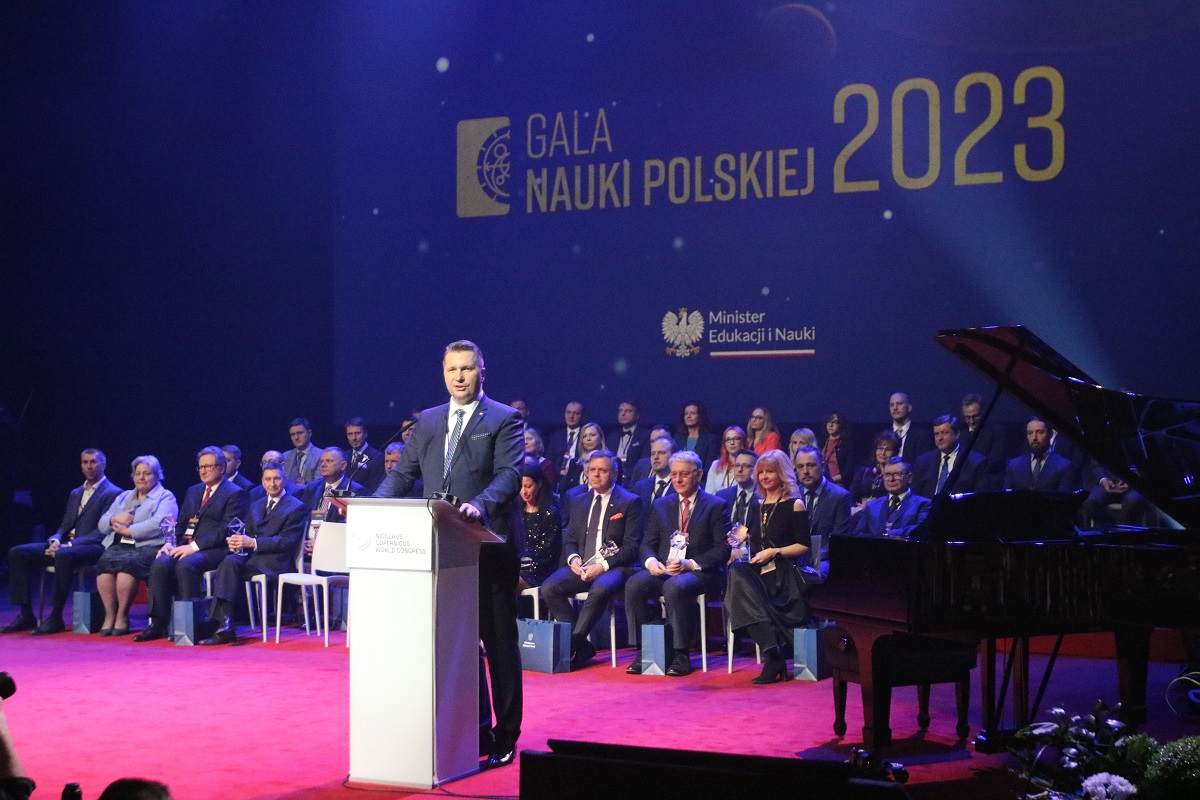
Appointments for the Secretary General and members of the Copernican Academy presented in Toruń (19.02.2023)
On Sunday in Toruń, during the Copernican World Congress, nominations were handed out for the Secretary General and members of the Copernican Academy, appointed to these positions by President Andrzej Duda.
Professor Krzysztof Górski was appointed Secretary of the Academy. Outstanding scientists with achievements of groundbreaking importance for the world of science were appointed as its members. They will be working in five chambers.
The following scientists were appointed to the Chamber of Astronomy and Mathematical and Natural Sciences: Dr. Arthur McDonald, Dr. George Efstathiou, Dr. Wacław Gudowski, Dr. Masashi Hazumi, Dr. Didier Queloz, Prof. Leszek Roszkowski, Prof. Marek Sarna, Prof. Marian Szymczak, Prof. Andrzej Udalski and Dr. Gianfranco De Zotti.
The members of the Chamber of Economic Sciences and Management will be Prof. Mariusz Andrzejewski, Prof. Sławomir Gawroński, Prof. Adam Glapiński, Prof. Robert Holzmann, Prof. Harold James, Prof. Zbigniew Krysiak and Dr. Dariusz Tworzydło.
Appointments to the Chamber of Philosophy and Theology were received by: Dr. Tory K. Baucum, Dr. Nigel Biggar, Rev. Prof. Paweł Bortkiewicz, Rev. Dr. Bernardo Estrada, Rev. Dr. Ermenegildo Manicardi, Rev. Cardinal Gerhard Müller, Dr. Wawrzyniec Rymkiewicz, Father Prof. Marcin Tkaczyk, Rev. Prof. Ireneusz Werbiński and Prof. Piotr Wilczek.
The members of the Chamber of Juridical Sciences will be Dr. Conor Casey, Prof. Fabrizio Giulimondi, Dr. Elżbieta Karska, Prof. Anna Łabno, Dr. Marius Ostrowski, Prof. Adrian Vermeule and Dr. Manuel Vescovi.
The following members were appointed to the Chamber of Medical Sciences: Dr. Mariano Bizzarri, Prof. Dr Adam Dziki, Prof. Grzegorz Gielerak, Prof. Ewa Marcinowska-Suchowierska, Dr. Leszek Markuszewski, Dr. Hans Meyer, Prof. Mansur Rahnama-Hezavah, Prof. Andrzej Rynkiewicz, Prof Adam T. Stys and Dr. Huey-Jen Su.
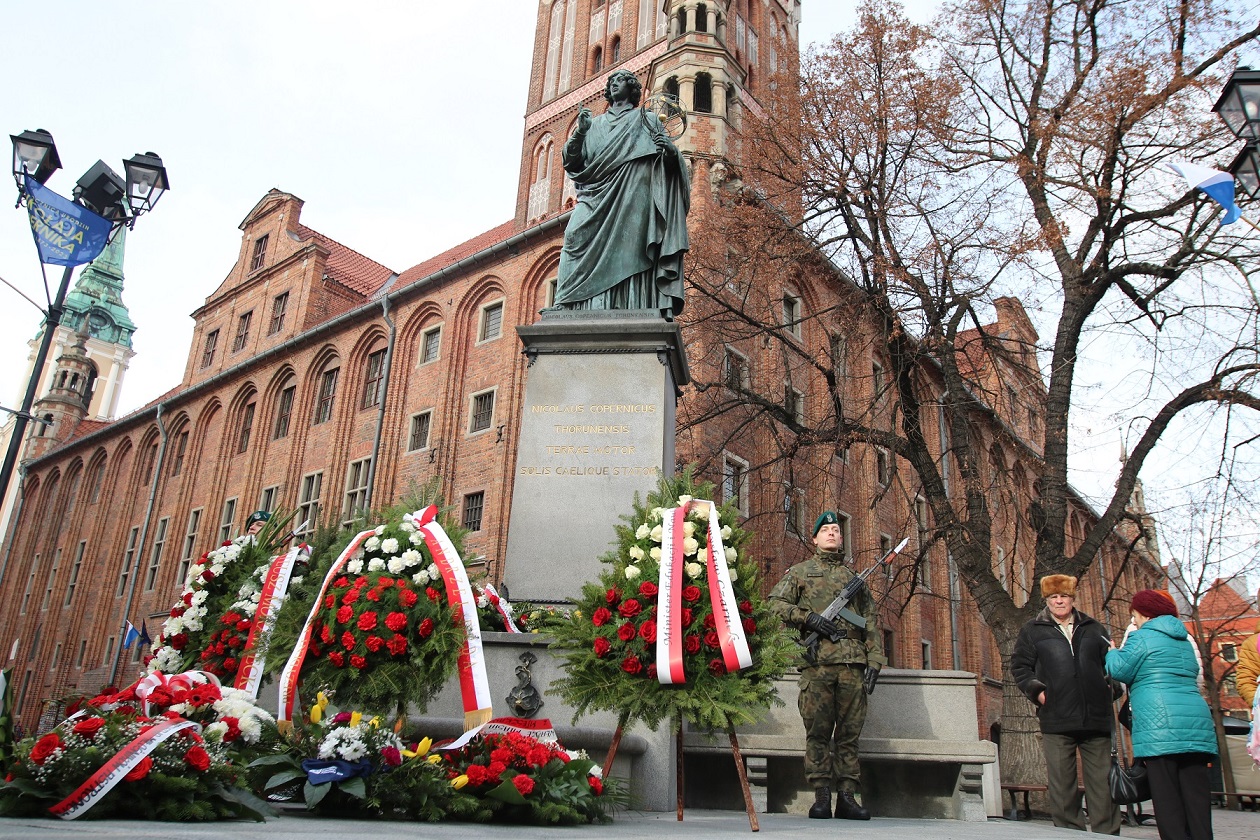
Minister of Education and Science talks to ... a robotic Copernicus (19.02.2023)
A robot resembling Nicolaus Copernicus has appeared at the Copernicus Science Centre in Toruń. Thanks to Artificial Intelligence, the robot can talk about anything. Copernicus was interviewed by the Minister of Education and Science, Przemysław Czarnek, who is participating in the First World Copernican Congress.
The head of the Ministry of Education and Science addressed the topic of “Get to know Poland”, one of the ministerial projects enabling pupils to get to know places and events important for national memory and identity, including issues related to Copernicus.
“Do you think, Nicolaus, that children should go, for example, to Frombork and visit places associated with your work”, asked the Minister.
“Yes, I think children should learn about their history by visiting places connected with my activities. This would certainly contribute to increasing their knowledge of science and its impact on the history of our country”, answeredthe astronomer. He also greeted Nobel laureates, researchers, experts and all the guests of the Congress.
Read more: https://www.gov.pl/web/edukacja-i-nauka/rozmowa-ministra-przemyslawa-czarnka-z-najbardziej-zaawansowanym-robotem-humanoidalnym-na-swiecie
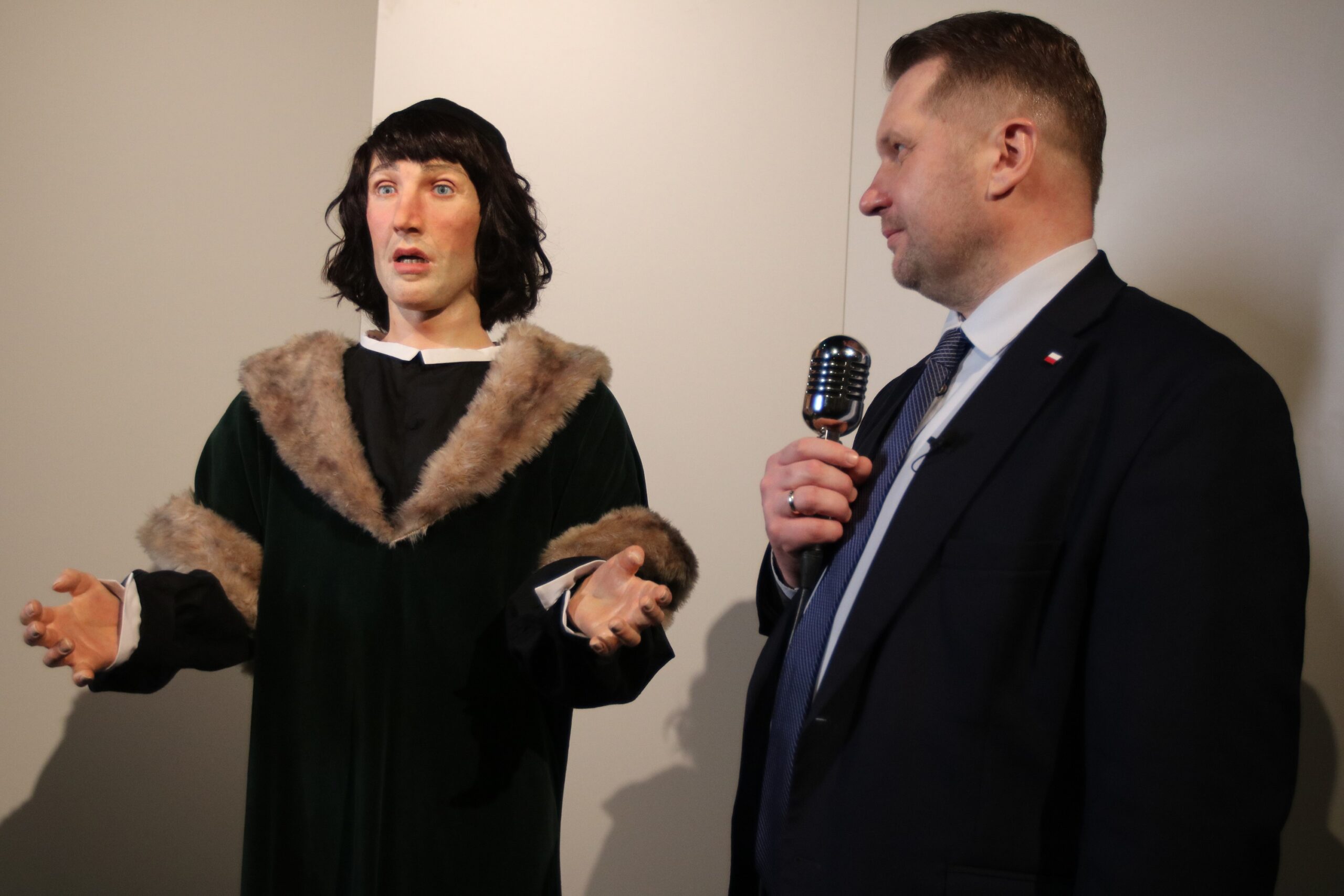
First World Copernican Congress launched the actual activities of the Copernican Academy (19.02.2023)
The first Copernican World Congress in Toruń has launched the actual activities of the Copernican Academy. It is attended by 700 researchers and experts, including five Nobel Prize winners. The opening of the congress marking the 550th anniversary of Nicolaus Copernicus’ birth – was combined with the celebration of Nicolaus Copernicus University. The ceremony was attended by the Minister of Education and Science, Przemysław Czarnek.
“The World Copernicus Congress is a great monument to Nicolaus Copernicus. The event is intended to emphasise Poland’s role not only in the past, but above all in the future”, said the head of the Ministry of Education and Science at the opening of the Congress. Earlier, Minister Czarnek laid a wreath at the monument to Nicolaus Copernicus.
Toruń is hosting panel discussions on astronomy, natural sciences, medicine, and economics. The programme also includes debates on history and politics, law and philosophy and theology. The areas of debates are determined by the disciplines dealt with by Copernicus.
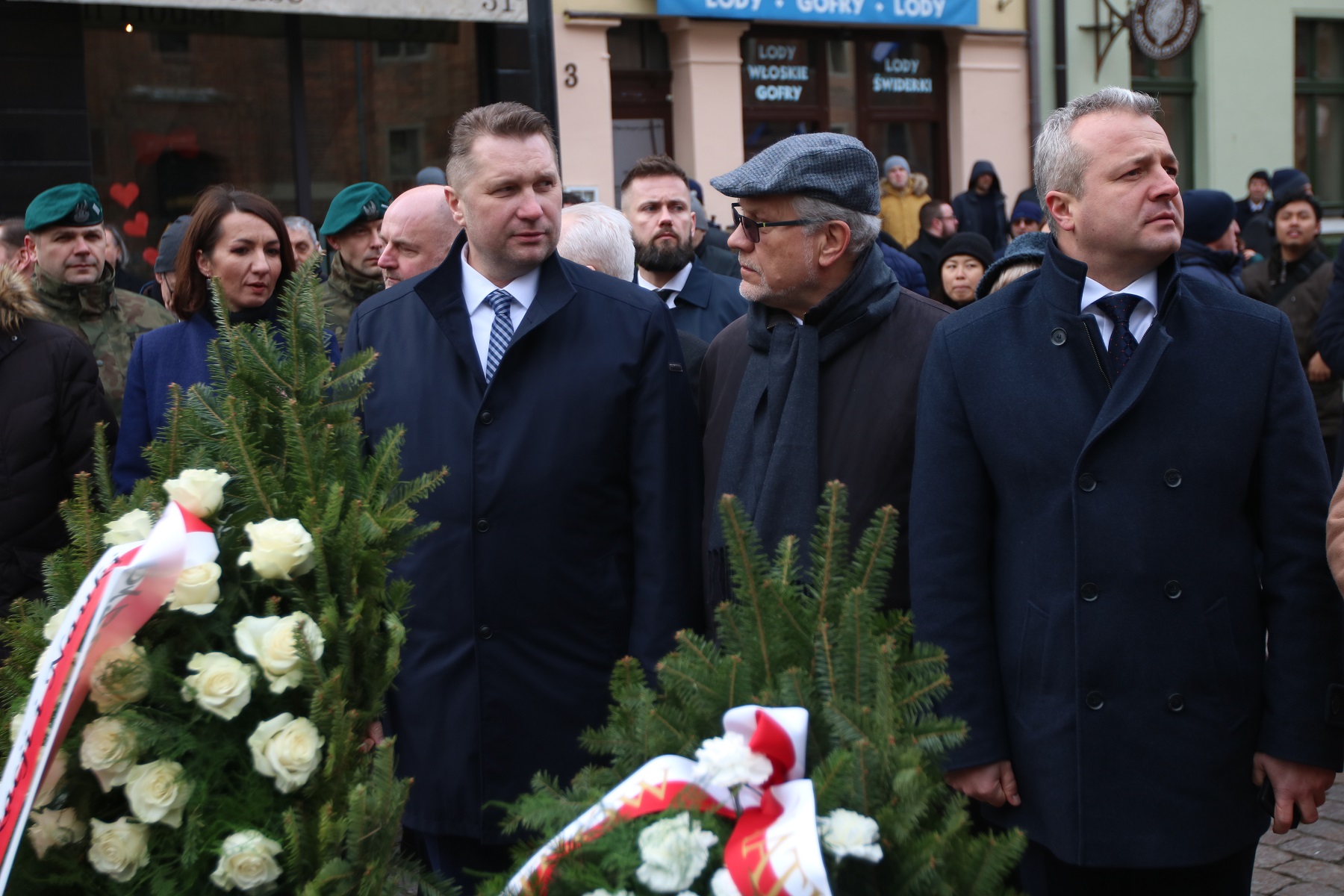
#Akademia_Kopernikanska #Światowy_Kongres_Kopernikanski (18.02.2023)
Five Nobel Prize winners, 700 researchers and guests, nearly 130 accredited journalists and, above all, debates at the highest scientific level in the world will be held in three days during the First World Copernican Congress, which not only will host the Polish Science Gala, but above all launch the actual activities of the Copernican Academy.
The Congress will begin on 19 February – on the 550th anniversary of Nicolaus Copernicus’ birth exactly. Obviously in Toruń. Because he himself throughout his later life emphasised his attachment to this place on earth. He introduced himself as Nicolaus Copernicus Thorunensis.
New institution in the system of Polish science
Until now, Poland’s eminent scientists in Poland have had their lives (including their scientific lives) at meridian zerobut having been elevated to the orbit of world science, working at the best universities all over the world, they most often no longer had an institutionalised contribution to the whole of Polish scientific life. The Copernican Academy is to change this. Now the scientific diffusion is to work both ways.
“The establishment of the Copernican Academy is not in competition with any national institution. On the contrary. It is a support, a complement to the missing link in the colourful landscape of science institutions in Poland”, says Prof. Krzysztof Górski.
This Polish astronomer was made the Secretary General of the Academy by a decision of the President of the Republic of Poland Andrzej Duda, countersigned by Prime Minister Mateusz Morawiecki, which was announced on Friday by the Minister of National Education and Science, Prof. Przemysław Czarnek.
Professor Górski himself has experienced the process. He is still an employee of the Astronomical Observatory of the University of Warsaw and has been conducting scientific research abroad for years. Since 2003, he has been employed at the California Institute of Technology (Caltech), where he has received, among others, NASA awards. In 2020 he was awarded a prize by the Foundation for Polish Science for developing and implementing a methodology for analysing relic radiation maps, key to understanding the early stages of the evolution of the Universe. So, the newly appointed Secretary General of the Copernican Academy is scientifically concerned with matters that were so close to Copernicus himself.
Copernican Academy to be managed by scientists
The Copernican Academy is based on five pillars, corresponding to the areas of Nicolaus Copernicus’ achievements that formed the basis for the organisation of the Academy’s chambers. They include astronomy, economics, law, medicine and theology and philosophy. Its activities will focus on selected areas of research, determined by the thematic scope of the Chambers operating within it: Astronomy and Mathematical and Natural Sciences, Medical Sciences, Economics and Management Sciences, Philosophy and Theology, and Legal Sciences. A House of Laureates of the Copernican Awards is also envisaged.
The Academy will consist of a maximum of 120 scientists appointed by the President of the Republic of Poland at the request of the individual Chambers of the Academy. The candidate must receive a written recommendation from at least two existing members and support within the Chamber as a whole. The first membership of the Academy (not exceeding half of the full membership of each Chamber) will be appointed by the President of the Republic of Poland at the request of the Minister of Education and Science during the First World Copernican Congress.
The Act on the Copernican Academy (Journal of Laws 2022, item 1459) sets out the general framework of the Academy’s organisation, which will ultimately be specified in the statutes of the Academy adopted by the General Assembly of the Copernican Academy. The first statute will be granted by the Prime Minister.
“Importantly, the Copernican Academy will be managed by scientists themselves. And from all over the world. It is an international corporation – made up of half Polish and half foreign scientists. And this is expected to facilitate the Academy’s primary objective – real participation in science from the first day of conception over its development, not just at its final stage. This is a fundamental change, explains Prof. Górski.
The Academy will implement a programme including the funding of scientific research, including the awarding of Copernican scholarships, Nicolaus Copernicus grants, support for the Nicolaus Copernicus School, the awarding of prizes or the appointment of Copernican Academy ambassadors.
5 Nobel Prize winners attending the 1st World Copernican Congress
The Renaissance interiors of the City Hall and Artus Manor will host over a dozen discussion panels devoted, of course, to astronomy, as well as natural sciences, medicine, economics, as well as history, politics, law and philosophy and theology. For they were all dealt with by Copernicus himself. So will the Academy, of which the Congress is the inauguration.
The event refers to the abundance of achievements of the most eminent Polish scientist. It is part of a comprehensive support system aimed at giving a new quality to Polish science and promoting it and our country. As such, it also has the character of a wide-ranging international event.
Among the many distinguished guests and speakers at the Congress will be:
Prof. P.J.E. Peebles, Canadian-American physicist, cosmologist, astrophysicist and astronomer, one of the pioneers of the theory of the formation of cosmic structures, winner of the 2019 Nobel Prize in Physics.
Prof. Michel Gustave Édouard Mayor, Swiss astronomer, Professor in the Department of Astronomy at the University of Geneva, winner of the 2019 Nobel Prize in Physics.
Prof. Barry Clark Barish, American experimental physicist, Professor Emeritus at the California Institute of Technology, leading expert on gravitational waves, winner of the 2017 Nobel Prize in Physics.
Prof. Arthur B. McDonald, Canadian physicist, Professor at Canada’s Queen’s University in Kingston, winner of the 2015 Nobel Prize in Physics.
Prof. Didier Patrick Queloz – Swiss astronomer, Professor at Cambridge University, winner of the 2019 Nobel Prize in Physics.
The congress is co-organised by Nicolaus Copernicus University in Toruń, Jagiellonian University in Krakow, University of Warmia and Mazury in Olsztyn and the Institute of the History of Science of the Polish Academy of Sciences. Due to the rich and still alive and developing Copernican traditions in those centres, the Congress will have a rolling programme. Sessions will be held successively in Toruń, Kraków and Olsztyn and back again in Toruń.
The event is held under the auspices of President of the Republic of Poland Andrzej Duda, Prime Minister Mateusz Morawiecki, Minister of Education and Science Przemysław Czarnek, as well as Kuyavian-Pomeranian Voivode Mikołaj Bogdanowicz, Marshal of the Kuyavian-Pomeranian Voivodeship Piotr Całbecki, Mayor of Toruń Michał Zaleski, and the National Bank of Poland.
Media contact: Marta Ławacz, 503 187 936, media@akademiakopernikanska.gov.pl
